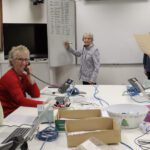C160/10
New Curtin University research is investigating the use of a school-based psychosocial educational program to improve the mental well-being and behaviour of young refugees traumatised by war.
The program is being trialled in private and state schools in the Perth metropolitan area and is targeted at children and adolescents aged eight to 18 years who have been exposed to war or violence before arriving in Australia.
Lead investigator, Associate Professor Clare Roberts from Curtin’s School of Psychology and Speech Pathology, said the mental well-being of traumatised young refugees is a growing problem and this at-risk group needs assistance.
“The number of refugees and asylum seekers is increasing worldwide and in Australia, with 44 per cent of these being children below the age of 18 years,” she said.
“Data indicates that refugees and asylum seekers are not receiving adequate treatment to overcome the impact of torture or trauma experiences. The specialist mental health services here are overloaded and cannot provide for the scale of demand for long-term treatment.
“There is also limited or no provision of services for torture or trauma counselling for children aged11 to 17 years.”
Curtin’s program is focused on the prevention of mental health issues in this at-risk group of young people.
“With this group-based program we hope to promote resilience and prevent mental illness due to trauma before it becomes a serious issue,” Associate Professor Roberts said.
“Currently only very severely traumatised children and adolescents receive assistance in schools, so there are many who can benefit from this program and learn how to cope before their situation escalates.
“Research has found that young people who are traumatised are at risk of developing other mental disorders, like depression and anxiety disorder, so we hope to be able to prevent this from happening.
“The program runs for eight weeks and we teach the children how to deal with lasting impact from trauma like bad dreams or nightmares. They learn physical relaxation and other coping strategies.
“The preliminary feedback we have received from the children is very positive, and if successful, this program can be used as a time and cost-effective intervention program for this disadvantaged group.”
The program commenced in April this year and will run till early 2011. It was recently awarded a 2010 Healthway Health Promotion Research Starter Grant.


